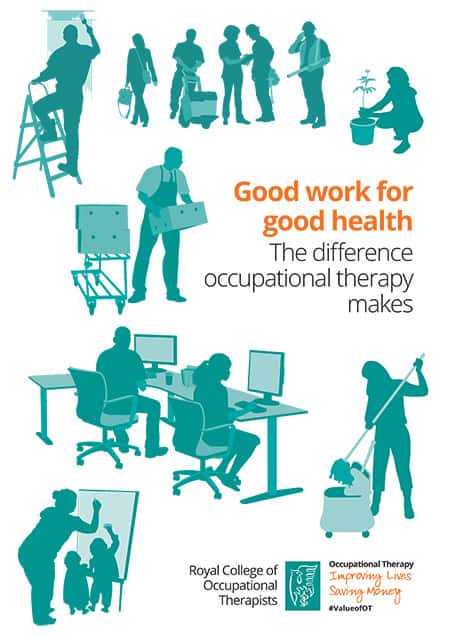New RCOT report highlights the essential role OTs have in increasing the number of disabled people in work

Part of the College’s ‘Occupational Therapy: Improving Lives, Saving Money’ campaign, the report demonstrates, through a series of case studies, how occupational therapists can help increase the number of disabled people in work.
It also calls for occupational therapists to be embedded in occupational health teams to provide staff, particularly in the NHS, with improved health and wellbeing services.
Commenting on the report, RCOT Chief Executive Julia Scott said: “Ill health costs the UK economy £100 billion per year. Take the NHS, the UK’s largest employer; on average its staff take 14 days as sick leave every year. People who have been signed off on sick leave for six months or more have less than a 50% chance of returning to work. None of this adds up to a healthy and happy workforce. Yet there is so much evidence which shows that being in employment and leading a productive life is good for our health. Occupational therapists can play a crucial role in helping this happen.
“Occupational therapy was founded upon principles related to the benefits of work and supporting people with health conditions to gain or return to paid employment. As the only healthcare profession to work across physical and mental health, with a focus on occupation (people’s everyday activities), RCOT is calling for every occupational health team to include an occupational therapist.”
RCOT’s ‘Occupational Therapy: Improving Lives, Saving Money’ campaign highlights how occupational therapists provide life-changing support to people of all ages and how can they save money for the public purse.
In the College’s latest report in the campaign, it says, at a universal level, occupational therapists can advise on work for people with health conditions. This involves looking at early intervention and advice on how workplaces can prevent poor health so a supportive workplace culture that values staff health and wellbeing can be realised.
At a targeted level, RCOT says occupational therapists can develop vocational services that support people to access and/or maintain employment. This includes OTs developing interventions aimed at those experiencing difficulties at work or getting into paid employment so that people with health conditions can better self-manage in the workplace.
Finally, at a specialist level, the report outlines that OTs can work with occupational health departments to support the health and wellbeing of staff. This includes occupational therapists using their skills to assess the work ability of individuals and creating a positive change to workplace attitudes to enable good work for people with disabilities and health conditions.
To further help with the ambition in helping people to stay in, and return to, work, the College is calling for:
- Access to occupational therapy through GPs
- A change in legislation so that allied health professionals (AHPs) can provide statutory sickness certification and advice on fitness for work
- Ongoing roll-out of Health and Work Champions programme – the project has, to date, trained over 100 OTs
To read the full report, visit: www.rcot.co.uk/node/112

